Table of Contents
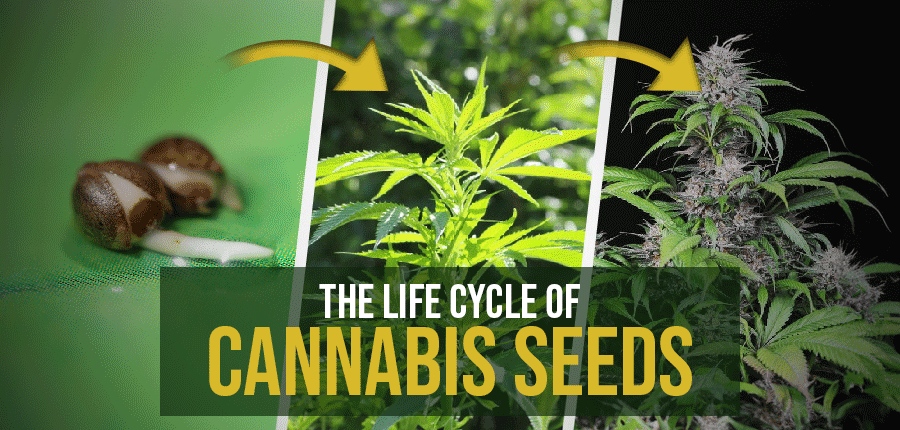
Following germination, cannabis seeds emerge as a young plant, marking the second stage within the life cycle of Cannabis cultivation. During this period, the seedling initiates the development of a cluster of little leaflets. Among the various stages of Cannabis plants, the seedling phase holds the highest risk and delicate nature. Its vulnerability makes it susceptible to destruction, necessitating utmost care from cultivators.
A seedling represents the embryonic stage of a plant enclosed within a seed coat, which later begins to sprout upon exposure to moisture. Subsequently, the emerging plant endeavors to seek out sunlight by growing inverted, aiming to rupture the seed casing. This phenomenon commonly occurs when seeds are cultivated beneath the soil or other materials, which necessitates their upward growth towards a light source. The seedling harnesses solar energy at this juncture, storing it for future growth. However, photosynthesis remains inactive during this phase, preventing stored energy utilization. Once the young plant reaches the soil’s surface, it instinctively seeks light, initiating the photosynthetic process. As a result, a series of leaves begin to develop, marking the commencement of the plant’s life cycle. The initial leaf set consists of a single leaflet, while subsequent sets yield three leaflets each.
In this stage, your young Cannabis plant does not require additional nutrients from its surroundings; therefore, it is unnecessary to introduce any supplemental elements. However, it is crucial to maintain regular watering for your plant, ensuring that the frequency remains moderate. Excessive watering during the seedling phase can lead to an abundance of moisture, which invites the growth of molds and bacteria, posing a threat to the plant’s well-being.
Regarding lighting schedules, your Cannabis seedling’s growth rate can be influenced by the intensity and color of the light it receives. Providing your seedlings with ample light is advisable, as they thrive in warmer temperatures. This is because Cannabis seedlings typically sprout when exposed to higher temperatures.
Seedlings necessitate a continuous 24-hour light cycle. In addition to warmth, providing them with consistent and uninterrupted light is vital, as it promotes faster development. In terms of humidity, seedlings require a humidity level ranging from 60% to 80% to maintain adequate moisture. As mentioned, seedlings do not require additional nutrients; they only need plain water with a pH level ranging from approximately 6.5 to 7.5.
The number of leaf fingers on the plant typically determines the transition to the vegetative stage in Cannabis. Many growers consider the seedling stage complete once the stems have thickened and developed 3-4 leaf nodes. The duration of the seedling stage varies depending on whether you are cultivating indoors or outdoors. When grown indoors, the seedling phase generally lasts approximately 3-4 weeks, whereas outdoor cultivation may extend the seedling stage up to 6 weeks.
Once your young Cannabis plants begin to establish a sturdy and resilient root system, the time for transplanting has arrived. However, even if the roots have gained strength, it is crucial to exercise caution during transplantation, as seedlings are incredibly delicate and prone to damage. Handle them carefully to avoid any harm or disturbance to the fragile stems, leaves, and roots. Providing a gentle touch and ensuring a smooth transition to their new growing environment will help safeguard your seedlings’ continued growth and well-being.
To provide optimal lighting conditions for your seedlings, it is recommended to position the light source approximately 5 cm above the plants. This distance helps prevent excessive heat exposure that could damage the seedlings. Maintaining consistent lighting is crucial, but be cautious about placing the light too far away from the seedlings as it may stretch the plants, making them more prone to tipping over.
When using high-intensity discharge (HID) or other light sources that generate significant heat, it is important to find an appropriate distance between the seedlings and the grow lights. An ideal distance is around 80 cm above the seedlings, ensuring they receive adequate light without excessive heat. A heat test beforehand can help determine the suitable placement for the grow lights, ensuring the seedlings receive the necessary warmth.
LED lights with a cooled spectrum are recommended for more efficient and effective lighting. Implementing an 18/6 light schedule, which entails providing 18 hours of light followed by 6 hours of darkness, can promote healthy growth and development of the seedlings.
One of the most prevalent errors made by certain cultivators, particularly beginners, is providing their seedlings with excessive supplements and nutrients. It is crucial to understand that Marijuana seedlings do not require additional nutrients for their growth. They simply need water with balanced pH, moisture, and sufficient light. It is advisable to allow the seedlings to thrive naturally during this growth stage rather than overwhelming them with elements at such an early phase of their life.
After a week or two, consider introducing feeding to your plants; however, using only half of the recommended dosage is vital. Failure to do so may result in the demise of your seedlings.
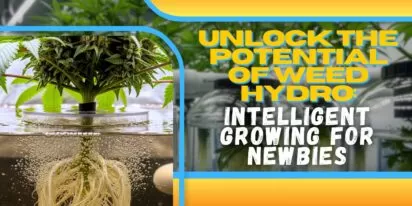
Curious about growing weed in a healthy, effective way? Welcome to the realm of weed hydro! This method uses water instead of soil, delivering n

Peyote Zkittlez is a unique cannabis strain that has quickly gained dedicated followers among enthusiasts and patients alike. Its parentage—Zk
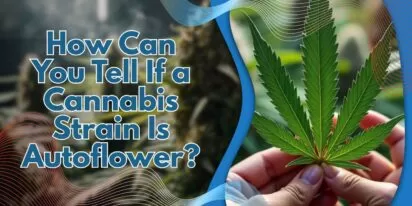
As growers, we want strains that work well, are strong, and are of good quality. Autoflowering cannabis strains are a big step forward for both

Pot growers always ask the same basic question: How much weed does a weed plant produce? The answer is complex and depends on a multitude of var

Ever had the room spin after a few hits? You're not alone. Figuring out how to prevent getting dizzy high can make your cannabis experience a wh
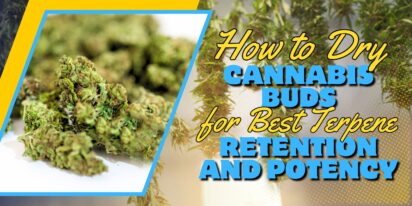
Drying cannabis properly is a critical process in preserving the plant's full aroma and flavor and its psychoactive abilities. Tampering with th

Ever caught yourself a bit too high and all of a sudden in need of being normal? Whether you're heading out for munchies or bumping into someone

Looking for sage advice on how not to get pinched with weed without batting an eye? Attempting to protect your stash from gossipy roommates, sno
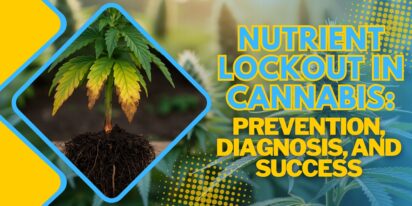
Nutrient lockout, also known as nutrient binding or chemical antagonism, is a significant issue in cannabis cultivation that negatively impacts
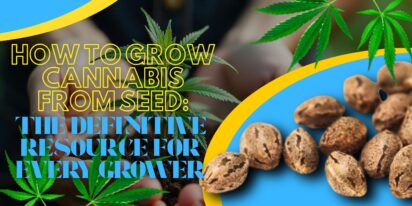
Germination is the most critical initial stage in growing healthy, high-quality cannabis plants. During germination, the dormant seed becomes a
Are You 18 Or Over?
By selecting “Continue”, you confirm that you are at least 18 years of age and legally permitted to access cannabis related content in your region.
By using Rocketseeds.com, you agree to our legal disclaimer.
Excellent blog here Also your website loads up very fast What web host are you using Can I get your affiliate link to your host I wish my web site loaded up as quickly as yours lol
Your writing is not only informative but also incredibly inspiring. You have a knack for sparking curiosity and encouraging critical thinking. Thank you for being such a positive influence!
Simply wish to say your article is as amazing The clearness in your post is just nice and i could assume youre an expert on this subject Well with your permission let me to grab your feed to keep updated with forthcoming post Thanks a million and please carry on the gratifying work
Somebody essentially lend a hand to make significantly articles Id state That is the very first time I frequented your website page and up to now I surprised with the research you made to make this actual submit amazing Wonderful task
Your blog is a beacon of light in the often murky waters of online content. Your thoughtful analysis and insightful commentary never fail to leave a lasting impression. Keep up the amazing work!
Thank you for the auspicious writeup It in fact was a amusement account it Look advanced to more added agreeable from you By the way how could we communicate
Your blog is a constant source of inspiration for me. Your passion for your subject matter shines through in every post, and it’s clear that you genuinely care about making a positive impact on your readers.
Your blog is a constant source of inspiration for me. Your passion for your subject matter is palpable, and it’s clear that you pour your heart and soul into every post. Keep up the incredible work!
Your articles never fail to captivate me. Each one is a testament to your expertise and dedication to your craft. Thank you for sharing your wisdom with the world.
Your blog is a testament to your dedication to your craft. Your commitment to excellence is evident in every aspect of your writing. Thank you for being such a positive influence in the online community.
Your writing has a way of resonating with me on a deep level. I appreciate the honesty and authenticity you bring to every post. Thank you for sharing your journey with us.
Your blog is a true gem in the world of online content. I’m continually impressed by the depth of your research and the clarity of your writing. Thank you for sharing your wisdom with us.
Hi i think that i saw you visited my web site thus i came to Return the favore Im attempting to find things to enhance my siteI suppose its ok to use a few of your ideas
Somebody essentially help to make significantly articles Id state This is the first time I frequented your web page and up to now I surprised with the research you made to make this actual post incredible Fantastic job
Usually I do not read article on blogs however I would like to say that this writeup very compelled me to take a look at and do so Your writing taste has been amazed me Thanks quite nice post
Your blog has quickly become one of my favorites. Your writing is both insightful and thought-provoking, and I always come away from your posts feeling inspired. Keep up the phenomenal work!
Every time I visit your website, I’m greeted with thought-provoking content and impeccable writing. You truly have a gift for articulating complex ideas in a clear and engaging manner.
Hey there You have done a fantastic job I will certainly digg it and personally recommend to my friends Im confident theyll be benefited from this site
I have read some excellent stuff here Definitely value bookmarking for revisiting I wonder how much effort you put to make the sort of excellent informative website
Nice blog here Also your site loads up very fast What host are you using Can I get your affiliate link to your host I wish my site loaded up as quickly as yours lol
What i do not understood is in truth how you are not actually a lot more smartlyliked than you may be now You are very intelligent You realize therefore significantly in the case of this topic produced me individually imagine it from numerous numerous angles Its like men and women dont seem to be fascinated until it is one thing to do with Woman gaga Your own stuffs nice All the time care for it up
Your blog is a beacon of light in the often murky waters of online content. Your thoughtful analysis and insightful commentary never fail to leave a lasting impression. Keep up the amazing work!
Your blog is a breath of fresh air in the often stagnant world of online content. Your thoughtful analysis and insightful commentary never fail to leave a lasting impression. Thank you for sharing your wisdom with us.
Your blog is a beacon of light in the often murky waters of online content. Your thoughtful analysis and insightful commentary never fail to leave a lasting impression. Keep up the amazing work!
Usually I do not read article on blogs however I would like to say that this writeup very compelled me to take a look at and do it Your writing style has been amazed me Thank you very nice article
Your writing has a way of resonating with me on a deep level. I appreciate the honesty and authenticity you bring to every post. Thank you for sharing your journey with us.
This hydroponics guide is quite the buzz, seriously! Who knew growing weed without dirt could be so complicated yet potentially rewarding? The breakdown of systems like DWC and NFT is helpful, though I suspect my cat might confuse the air pump for a toy. The idea of cleaner buds is tempting, especially since explaining hydro weed to my non-growing friends might get messy. And the bit about potential dizziness from hydro weed? Perfect, now I have an excuse for why I always stumble a bit after a grow session. Still, the promise of faster grows and higher yields is hard to ignore, even if it means more trips to the pH meter than to the coffee shop. Overall, a cultivating read for the curious grower!